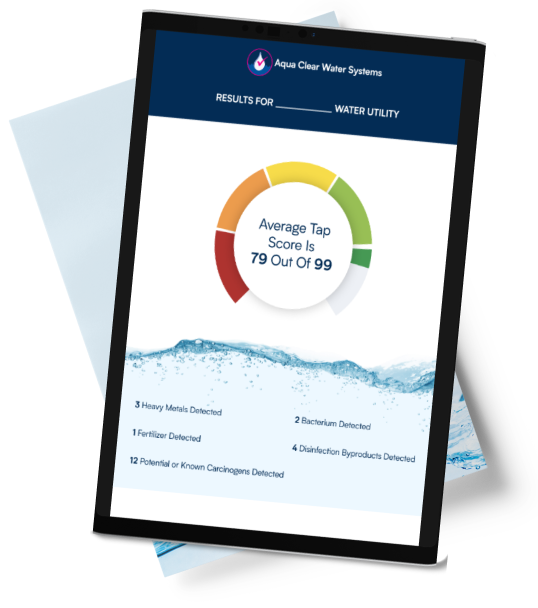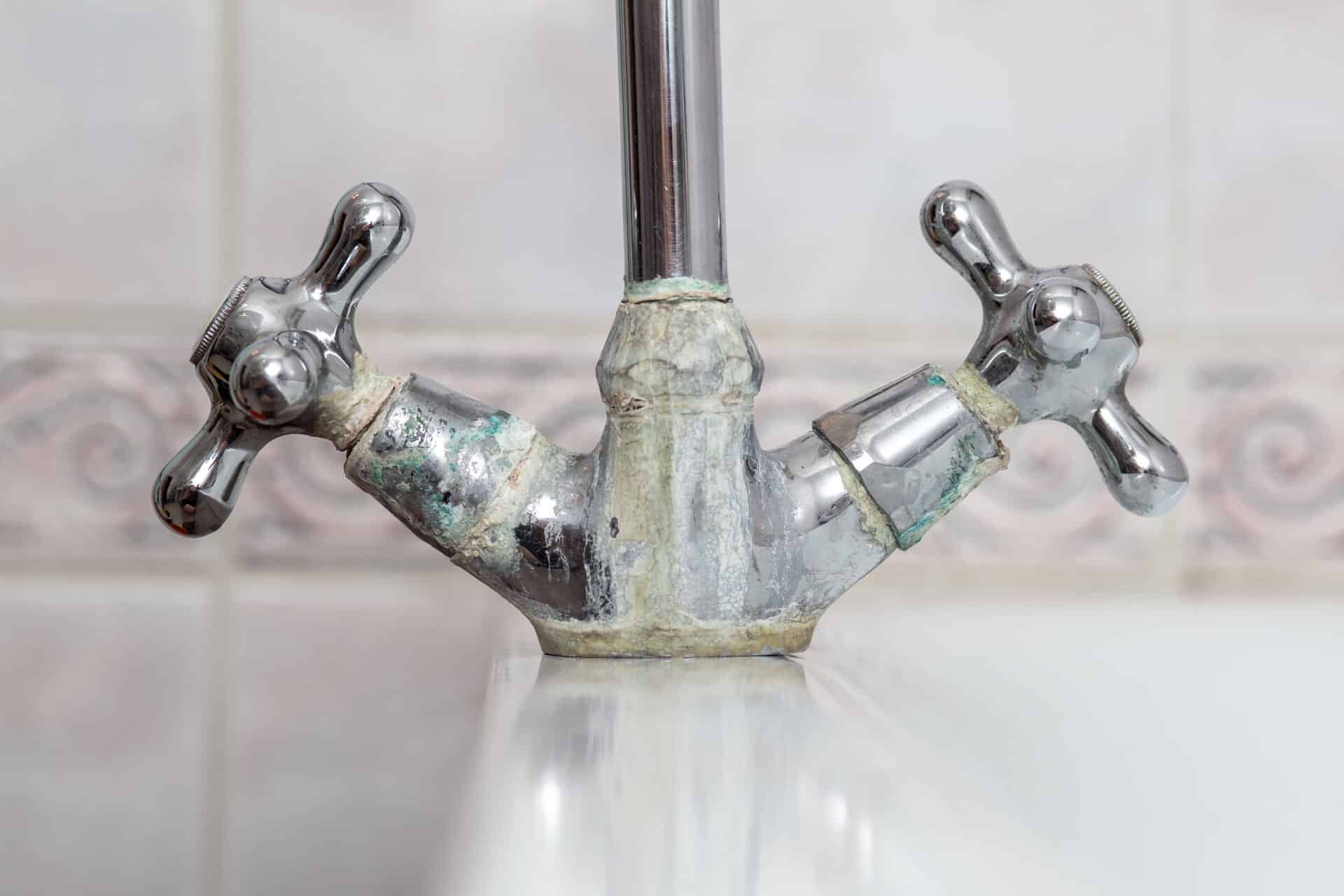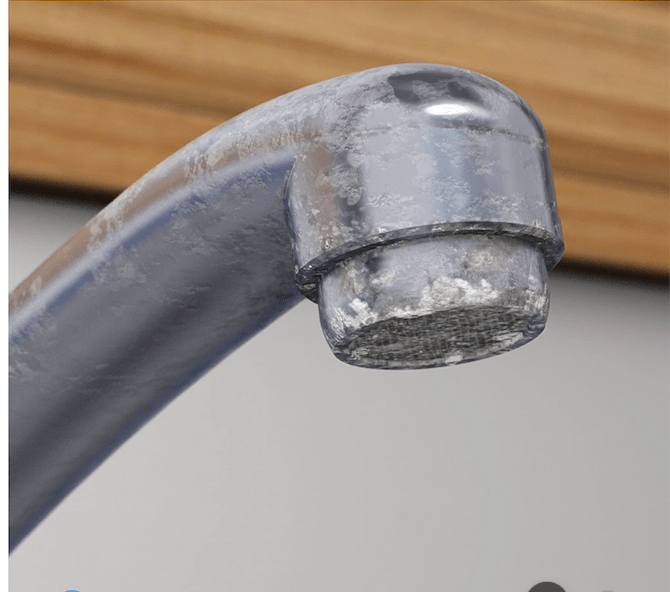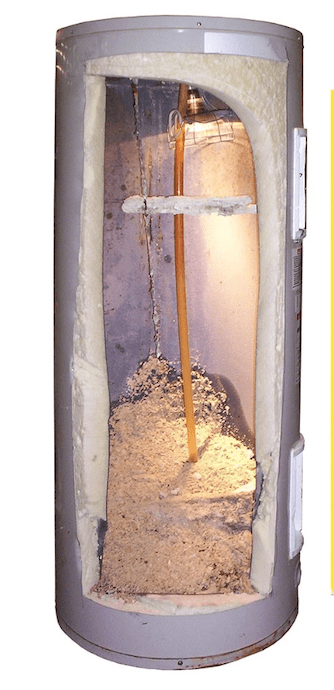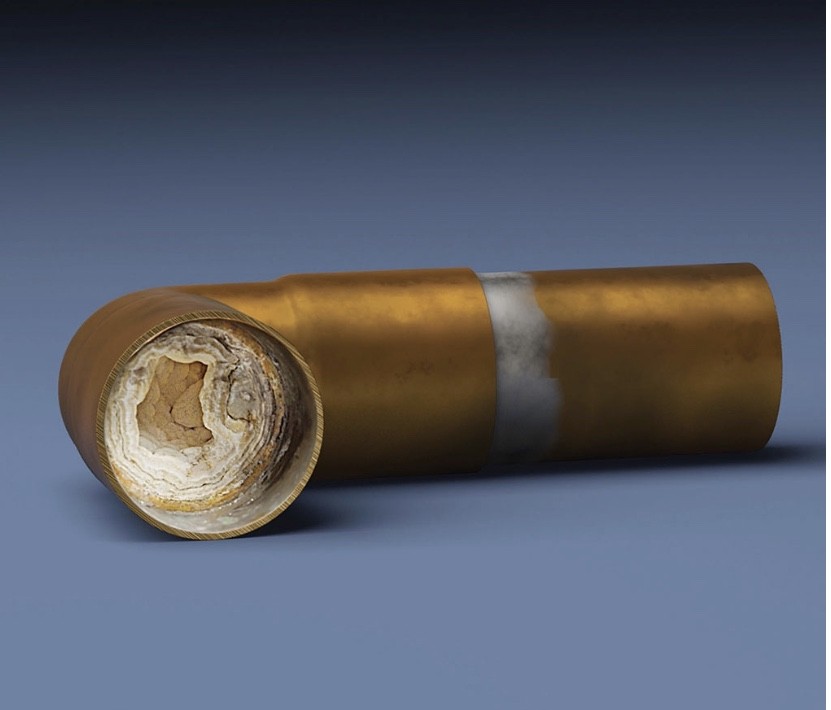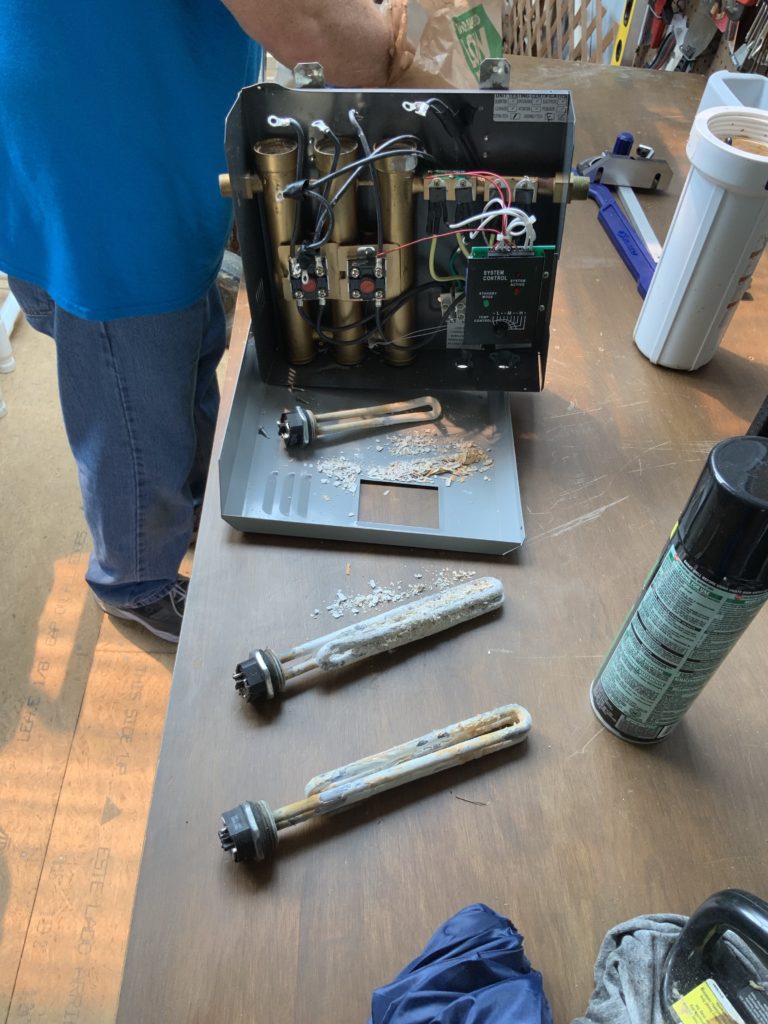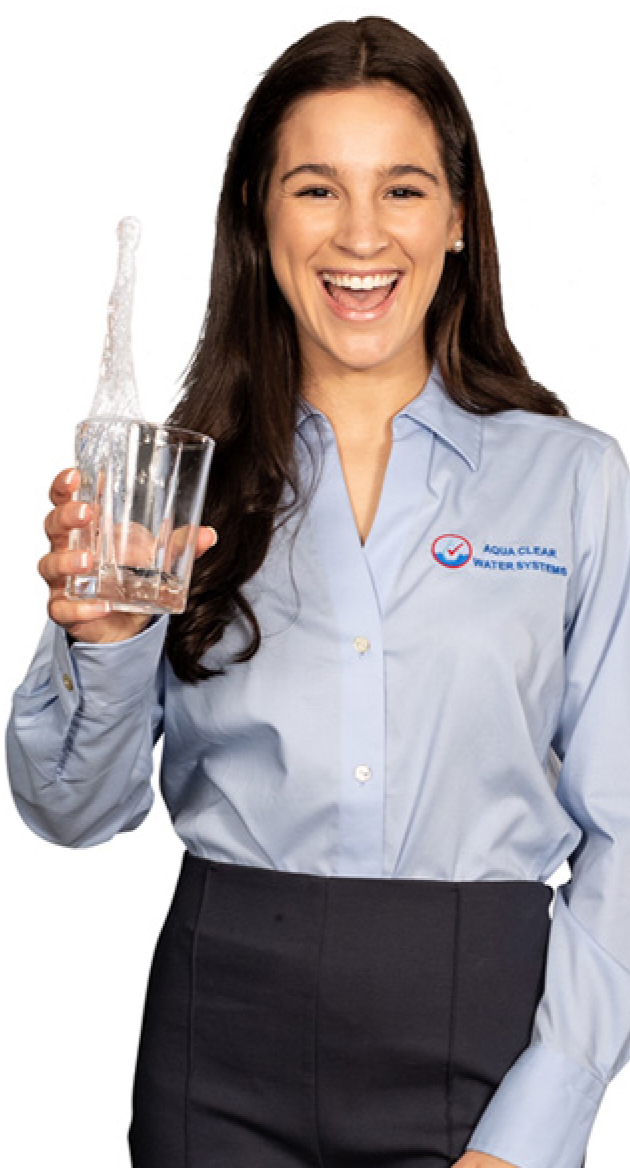When homeowners ask about water quality, one of the first questions is often: “Do I have hard water?” If you rely on a private well, the answer is usually yes , but it’s not always that simple. Water hardness varies depending on your local geology, your well’s depth, and the natural mineral content of the surrounding soil and rock.
Understanding whether your water is hard or soft is more than just trivia. Hard water can impact your plumbing, your appliances, your laundry, and even your hair and skin. Let’s break down what well water hardness means, why it matters, and how you can protect your home.
What Makes Water “Hard” or “Soft”?
Hard water contains dissolved minerals, primarily calcium (Ca) and magnesium (Mg). These minerals dissolve naturally as groundwater travels through layers of rock and soil. Soft water, on the other hand, has little to no mineral content.
Water hardness is typically measured in milligrams per liter (mg/L) or grains per gallon (gpg), expressed as calcium carbonate (CaCO₃):
- Soft: 0–60 mg/L (0–3.5 gpg)
- Moderately Hard: 61–120 mg/L (3.6–7.0 gpg)
- Hard: 121–180 mg/L (7.1–10.5 gpg)
- Very Hard: 181+ mg/L (10.6+ gpg)
In Tennessee and much of the U.S., most well water falls into the hard to very hard category.
Why Well Water Is Often Hard
Wells draw water directly from underground aquifers. As water seeps down through soil and rock layers, it dissolves minerals like calcium and magnesium along the way. Unlike municipal water, which may be treated and softened at a city facility, private well water enters your home untreated.
That’s why 85% of U.S. homes have some level of hard water , and wells are especially prone to higher concentrations.
Signs of Hard Well Water
Hard water often goes unnoticed until the effects start showing up around your home:
- Scale buildup on faucets, sinks, and shower doors
- Reduced water pressure from mineral deposits clogging pipes
- Shorter appliance lifespan in water heaters, dishwashers, and washing machines
- Soap scum in bathtubs, showers, and sinks
- Dry, itchy skin and dull, lifeless hair
- Faded, stiff clothing after repeated washes
- Spots and streaks left on dishes and glassware
Why Hard Water Can Be a Problem
Hard water isn’t typically harmful to drink, but it causes damage and inefficiency in nearly every other area of your home:
- Plumbing: Mineral deposits clog pipes and reduce flow.
- Appliances: Scale buildup reduces efficiency, increases energy costs, and leads to early breakdowns.
- Cleaning: Soap and detergents don’t lather well, meaning you use more and still get poorer results.
- Self-care: Hard water leaves residue on your skin and scalp, leading to dryness and irritation.
- Laundry: Colors fade, fabrics stiffen, and clothes wear out up to 15% faster.
How to Treat Hard Well Water
The only proven way to truly remove hardness minerals is with a salt-based water softener using ion exchange technology. Here’s how it works:
- Hard water passes through a tank filled with resin beads charged with sodium or potassium ions.
- Calcium, magnesium, and iron ions swap places with sodium or potassium.
- The softened water exits the tank, free of hardness minerals.
- When the resin beads are full, the system regenerates with a brine rinse to recharge them.
Why We Recommend Kinetico® Softeners
Unlike conventional single-tank softeners, Kinetico’s twin-tank, non-electric design solves common performance issues:
- No electricity needed → no electronics to fail.
- 24/7 soft water → one tank regenerates while the other stays online.
- Regeneration with softened water → longer resin life and cleaner operation.
- Counter-current regeneration → uses less salt, saving money long-term.
- All moving parts bathed in soft water → prevents fouling and wear.
Benefits of Softening Well Water
When you install a whole-home water softener, you’ll notice the difference almost immediately:
- Cleaner, softer skin and hair
- 50% less soap and detergent use
- Longer-lasting appliances
- Lower energy bills (water heaters run more efficiently with soft water)
- Brighter, softer laundry
- Scale-free sinks, showers, and faucets
- Less time spent cleaning
- Savings of $500–$800+ per year by reducing the hidden costs of hard water
Hardness Scale Provided by the Water Quality Association (WQA)
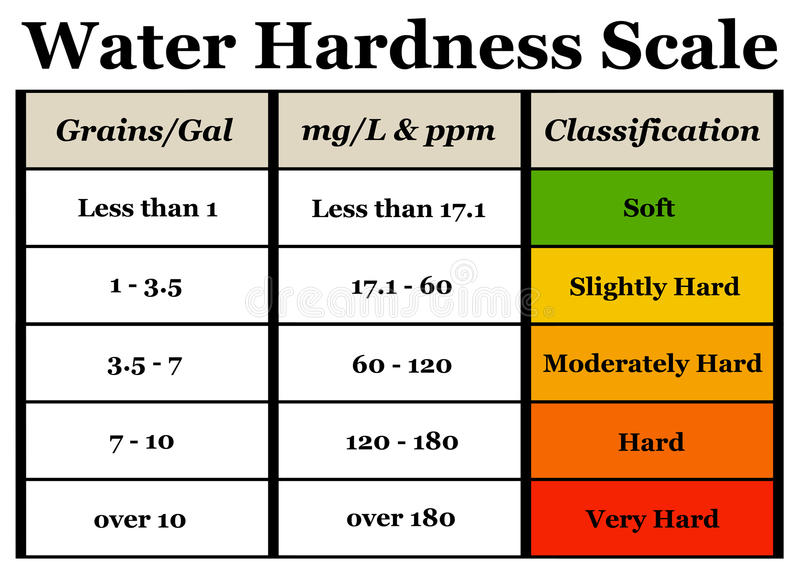
Most water municipalities in the East Tennessee region are in the Moderately Hard to Hard water category. And most well water in the region is Hard to Very Hard.
Dissolved hardness minerals can cause numerous problems for the plumbing system in the home. Probably the biggest impact is seen as scale formation. Where water is hard, calcium carbonate scale build-up will occur on faucets, sinks, counters and anywhere water is used regularly.
-
Faucet being damaged by hard water -
Inside tank water heater that has used hard water -
Copper pipe with calcium carbonate buildup
-
Tankless water heater that has been damaged by hard water
Scale build-up is the most damaging and costly inside the plumbing system where it cannot be seen. Heated hard water forms a scale of calcium and magnesium minerals that decreases the efficiency of water-using appliances, especially water heaters, and leads to premature failure. Pipes can become clogged with scale that reduces water flow and ultimately requires pipe replacement.
Hard water also interferes with almost every cleaning task: laundry, dish washing, bathing, and personal grooming. Soap used in hard water combines with the minerals to form a sticky soap scum, and is often seen as bathtub rings or on shower doors and is difficult to remove.
Bathing with soap in hard water leaves a film of sticky soap scum on skin and clogs pores. The film may prevent removal of soil and bacteria. Soap scum interferes with the return of skin to its normal, slightly acid condition, and may lead to irritation and dry skin conditions.
Soap scum on hair may make it dull, lifeless and difficult to manage. When doing laundry in hard water, soap scum lodges in fabric during washing to make fabric stiff and rough. Incomplete soil removal from laundry causes graying of white fabric and loss of brightness in color. Continuous laundering in hard water can shorten the life of clothes by up to 15%, because of the abrasive nature of the mineral-laden soap scum. In addition, soap scum can deposit on dishes, bathtubs and showers, and all water fixtures.
Benefits of Softening Your Water
There are many benefits of installing a whole house water softening system:
- Clean, soft skin and hair
- Cut soap use by 50% or more
- Appliances more efficient & last longer
- Save 19-35% energy heating water
- Save money on health-care products
- Whole house is cleaner
- No more scale buildup or stains
- Less work to keep home clean
- Clothes last longer (15%+)
- Save the family $500-$800+ per year from the effects of hard water
Treatment for Hard Water
The salt based water softener is the ONLY way to reduce water hardness. All water softeners work on the same basic principle. The hardness minerals calcium and magnesium (as well as soluble iron and manganese) are removed from the source water using a process called ion exchange.
The medium for ion exchange is called the ion exchange resin and is commonly tiny activated polystyrene beads that have been pre-loaded with sodium or potassium ion on active sites. When the hard water encounters the resin column inside the softener tank, the calcium, magnesium, ferrous iron, and manganese ions are strongly attracted to the sites on the resin beads. Thus, they cling to the beads, displacing the sodium or potassium atoms, which depart in the water stream. By the time the water exits the resin bed, the resin has trapped all the hardness minerals and the softened water is free of calcium and magnesium.
Eventually, depending on water use, water hardness and the size of the bed, the resin bed becomes saturated with calcium, magnesium, ferrous iron, and manganese and cannot effectively remove anymore hardness. Then the bed must be “regenerated” before further use. The regeneration step is achieved by flushing the ion exchange bed with a brine mixture (salt and water), which releases the trapped ions from resin and send them down the drain. The resin bed is then backwashed with water before it is ready for service again.
Conventional single-tank water softeners often struggle with this regeneration step because they are forced to use untreated water with hardness, iron and manganese to clean the system. This leads to poor system performance. Moreover, when a conventional single-tank water softener enters a regeneration cycle, the resin bed is not available for water softening. Thus, hard water will be entering the home during regeneration cycles.
Kinetico® has solved these troublesome issues with their unique twin-tank, non-electric design. See all the advantages of the Kinetico® system below:
1. Non-electric operation
The Kinetico® water conditioning systems require NO ELECTRICITY. The advantages of this are huge:
No delicate and expensive printed circuit boards to degrade, short out, repair or replace. No electric solenoids to fail. Nothing to set or adjust. No timers.
Not affected by power outages, which render electric units non-functional.
2. Twin-tank system
Conditioned water is available in the home 24/7 with a Kinetico® system. Even when one tank is being regenerated , the other tank is providing conditioned water to the home – without interruption. The Kinetico® system is 100% “demand-operated”. The means the system works based on how much water is used, not according to some arbitrary time setting or fixed settings.
3. Conditioned water used to regenerate
The entire regeneration cucle is done using conditioned water from the tank that is in-service. It also regenerates using a “counter-current flow” giving better salt useage efficiency and longer media life. No more iron fouling or hardness build-up in beds or the valve.
4. All moving parts bathed in conditioned water
All moving parts in the Kinetico® system are in contact with only treated water. This prevents fouling and scaling up of any of the critical control module components, passageways, valves, or moving parts.
We hope this helped you understand what water hardness is, how it effects you and your home, and how to treat it. If you would like a FREE water test and consultation click the button below and we would love to help you take the first step to soft water.
At Aqua Clear Water Systems, we pride ourselves on being the highest quality water filtration company in all of Tennessee.
Frequently Asked Questions About Well Water Hardness
How do I know if my well water is hard or soft?
The most reliable way is to schedule a professional water test. Hardness isn’t always visible in the water itself, but the signs (scale buildup, soap scum, dry skin, faded laundry) often give it away. A free water test can measure your exact hardness level in grains per gallon.
Is all well water considered hard water?
Not all, but most. Since well water comes directly from underground aquifers rich in calcium and magnesium, hardness is very common. However, levels vary depending on your location, the depth of your well, and local geology.
Can well water be soft water?
Yes, it’s possible. Some wells tap into aquifers with lower mineral concentrations, which can result in naturally soft water. That said, most wells in the U.S. , especially in regions like Tennessee , produce hard or very hard water.
Is well water hard on your skin?
Yes. Hard water leaves behind a film of soap scum that clogs pores and strips away natural oils. This can lead to dryness, itchiness, irritation, and even worsen conditions like eczema. Softened water helps your skin stay cleaner and more hydrated.
Can you drink hard well water?
Yes. Hard water isn’t considered a health hazard, though high mineral content can alter taste and contribute to scale inside your body’s plumbing, your kidneys, in the form of kidney stones for sensitive individuals.
How does hard water affect hair?
Hard water deposits minerals on your hair, making it feel rough, look dull, and resist absorbing moisture. It can also cause frizziness, tangling, and shorter-lasting color treatments.
What’s the difference between city water hardness and well water hardness?
City water is often treated before reaching your tap, but can still be hard depending on the source. Well water bypasses treatment, which means hardness minerals are almost always higher.
How often should I test my well water?
At least once a year. Conditions underground can change over time, and testing ensures you catch hardness, iron, bacteria, or other issues before they become expensive problems.


